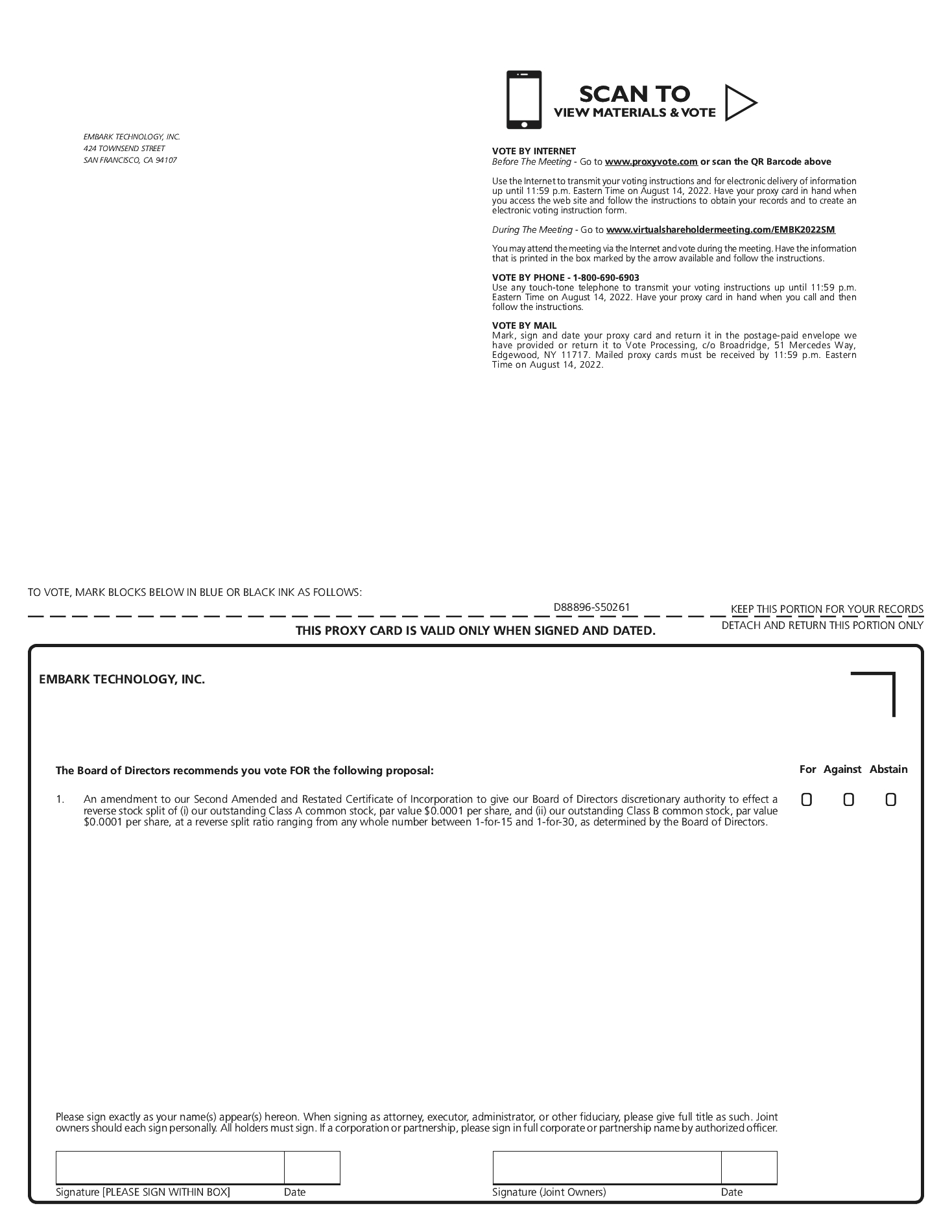Class B common stock, as required by our Certificate of Incorporation. Except for adjustments that may result from the treatment of fractional shares (as described below), the Reverse Stock Split would affect all stockholders uniformly and would not change any stockholder’s relative percentage ownership interest in the Company, voting rights, or other rights that accompany shares of our Common Stock. Shares of our Common Stock issued pursuant to the Reverse Stock Split will remain fully paid and non-assessable, and the par value per share of Common Stock will remain $0.0001.
As of the Record Date, the Company had [•] shares of Common Stock outstanding, consisting of [•] shares of Class A common stock and 87,078,981 shares of Class B common stock. For purposes of illustration, if the Reverse Stock Split is effected at a ratio of 1-for-15, 1-for-20, 1-for-25, or 1-for-30, the number of issued and outstanding shares of Class A common stock after the Reverse Stock Split would be approximately [•] shares, [•] shares, [•] shares, and [•] shares, respectively, and the number of issued and outstanding shares of Class B common stock after the Reverse Stock Split would be approximately 5,805,265 shares, 4,353,949 shares, 3,483,159 shares, and 2,902,632 shares, respectively.
Relative Increase in Number of Authorized Shares of Common Stock for Issuance
The Reverse Stock Split will not affect the number of authorized shares of Common Stock, which will remain at 4,110,000,000 shares, consisting of (i) 4,000,000,000 shares of Class A common stock, (ii) 100,000,000 shares of Class B common stock, and (iii) 10,000,000 shares of preferred stock.
Although the number of authorized shares of our Common Stock will not change as a result of the Reverse Stock Split, the number of shares of our Common Stock issued and outstanding will be reduced in proportion to the ratio selected by the Board. Thus, the Reverse Stock Split will effectively increase the number of authorized and unissued shares of our Common Stock available for future issuance by the amount of the reduction effected by the Reverse Stock Split.
If the proposed amendment to the Certificate of Incorporation is approved, all or any of the authorized and unissued shares of Class A common stock may be issued in the future for such corporate purposes and such consideration as the Board deems advisable from time to time, without further action by the stockholders of our Company and without first offering such shares to our stockholders. When and if additional shares of Class A common stock are issued, these new shares would have the same voting and other rights and privileges as the currently issued and outstanding shares of Class A common stock, including the right to cast one vote per share. However, under our Certificate of Incorporation, additional shares of Class B common stock may not be issued unless such issuance is approved by the affirmative vote of the holders of a majority of the outstanding shares of Class A common stock voting as a separate class and only for a limited period of time.
Except pursuant to the Company’s equity incentive plans for our employees and directors, outstanding warrants (described below) and the Company’s agreement with CF Principal Investments LLC (“Cantor”) pursuant to which the Company has the right, but not the obligation, to sell to Cantor shares of our Class A common stock up to a specified amount at our option (referred to herein as the “Committed Equity Facility”), the Company presently has no plan, commitment, arrangement, understanding, or agreement regarding the issuance of Common Stock. However, the Company regularly considers its capital requirements and may conduct securities offerings, including equity and/or equity linked offerings, in the future. Any shares issuable pursuant to the above described plans, warrants, and the Committed Equity Facility will be subject to the Reverse Stock Split ratio determined by the Board
Because our stockholders have no preemptive rights to purchase or subscribe for any of our unissued shares of Common Stock, the future issuance of additional shares of Common Stock will reduce our current stockholders’ percentage ownership interest in the total outstanding shares of Common Stock. In the absence of a proportionate increase in our future earnings and book value, an increase in the number of our outstanding shares of Common Stock would dilute our projected future earnings per share, if any, and book value per share of all our outstanding shares of Common Stock. If these factors were reflected in the price per share of our Common Stock, the potential realizable value of a stockholder’s investment could be adversely affected. An issuance of additional shares could therefore have an adverse effect on the potential realizable value of a stockholder’s investment.
The Reverse Stock Split will have no effect on the number of authorized shares of preferred stock or the par value of the preferred stock, and we do not have any outstanding shares of preferred stock.



 Tweet
Tweet Share
Share











